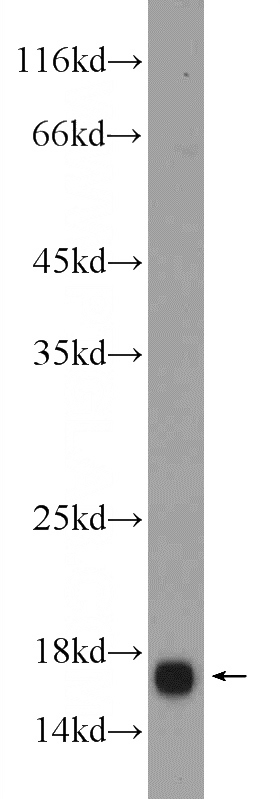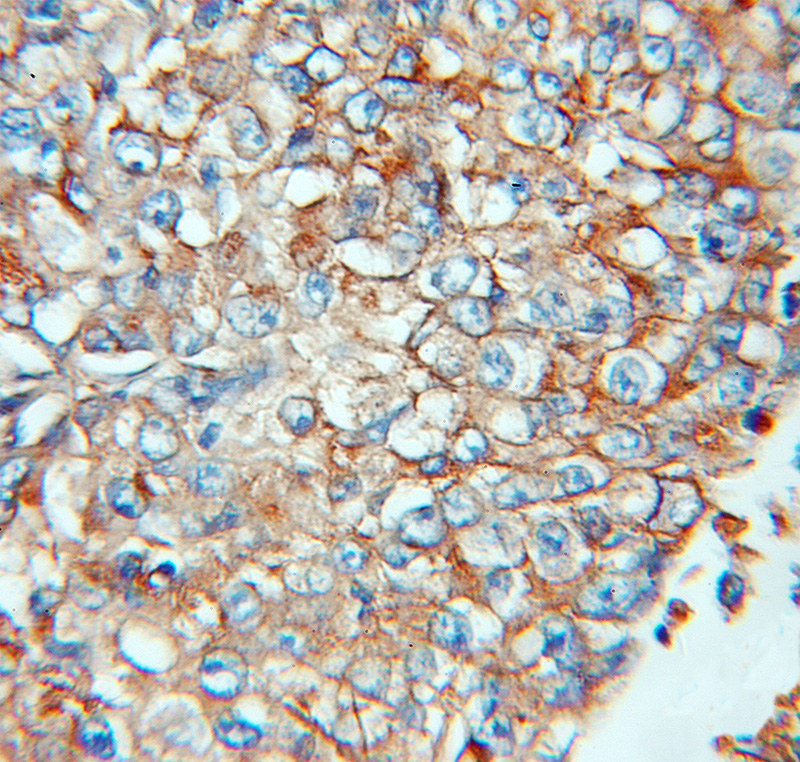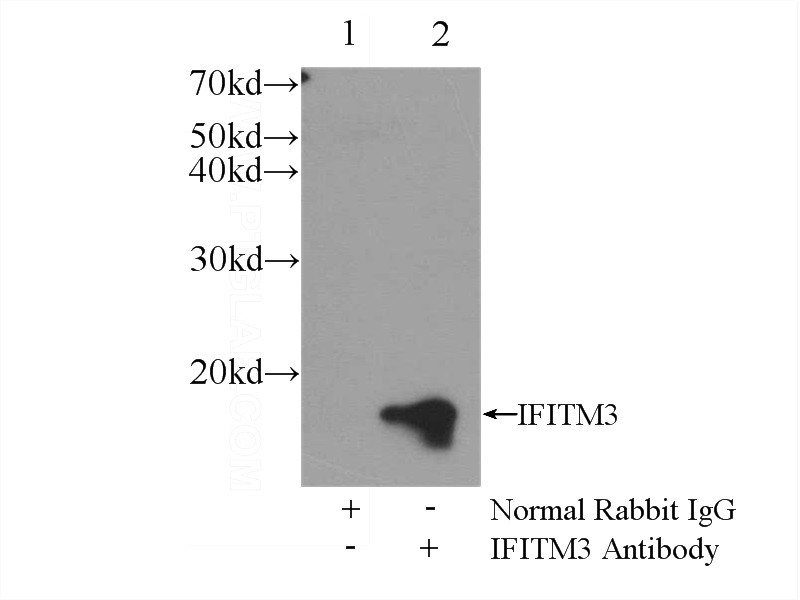-
Product Name
IFITM3 antibody
- Documents
-
Description
IFITM3 Rabbit Polyclonal antibody. Positive IHC detected in human lung cancer tissue, human colon cancer tissue. Positive WB detected in mouse colon tissue, HeLa cells. Positive IP detected in HeLa cells. Observed molecular weight by Western-blot: 14 kDa
-
Tested applications
ELISA, IHC, IP, WB
-
Species reactivity
Human,Mouse,Rat; other species not tested.
-
Alternative names
1 8U antibody; Fragilis antibody; IFITM3 antibody; IP15 antibody
-
Isotype
Rabbit IgG
-
Preparation
This antibody was obtained by immunization of IFITM3 recombinant protein (Accession Number: NM_021034). Purification method: Antigen affinity purified.
-
Clonality
Polyclonal
-
Formulation
PBS with 0.1% sodium azide and 50% glycerol pH 7.3.
-
Storage instructions
Store at -20℃. DO NOT ALIQUOT
-
Applications
Recommended Dilution:
WB: 1:500-1:5000
IP: 1:500-1:5000
IHC: 1:20-1:200
-
Validations

mouse colon tissue were subjected to SDS PAGE followed by western blot with Catalog No:111624(IFITM3 Antibody) at dilution of 1:1000

Immunohistochemical of paraffin-embedded human lung cancer using Catalog No:111624(IFITM3 antibody) at dilution of 1:100 (under 10x lens)

IP Result of anti-IFITM3 (IP:Catalog No:111624, 3ug; Detection:Catalog No:111624 1:1500) with HeLa cells lysate 2400ug.
-
Background
IFITM3, also named as interferon-inducible protein 1-8U, belongs to the CD225 family. It is IFN-induced antiviral protein that mediates cellular innate immunity to at least three major human pathogens, namely influenza A H1N1 virus, West Nile virus (WNV), and dengue virus, by inhibiting the early steps of replication. IFITM3 is identified as interferon-induced cellular proteins that restrict infections by retroviruses and filoviruses and of influenza virus and flaviviruses, respectively. IFITM3, the most potent antiviral IFITM, was found to inhibit an uncharacterized early infectious event after VSV endocytosis, but before primary transcription of its viral genome. IFITM proteins are viral restriction factors that can inhibit infection mediated by the influenza A virus (IAV) hemagglutinin (HA) protein. They differentially restrict the entry of a broad range of enveloped viruses, and modulate cellular tropism independently of viral receptor expression. Catalog#11714-1-AP is a rabbit polyclonal antibody raised against the full-length of human IFITM3.
-
References
- Jiang D, Weidner JM, Qing M. Identification of five interferon-induced cellular proteins that inhibit west nile virus and dengue virus infections. Journal of virology. 84(16):8332-41. 2010.
- Tartour K, Appourchaux R, Gaillard J. IFITM proteins are incorporated onto HIV-1 virion particles and negatively imprint their infectivity. Retrovirology. 11:103. 2014.
- Qian J, Le Duff Y, Wang Y. Primate lentiviruses are differentially inhibited by interferon-induced transmembrane proteins. Virology. 474:10-8. 2015.
- Compton AA, Bruel T, Porrot F. IFITM proteins incorporated into HIV-1 virions impair viral fusion and spread. Cell host & microbe. 16(6):736-47. 2014.
- Zhang W, Zhang L, Zan Y, Du N, Yang Y, Tien P. Human respiratory syncytial virus infection is inhibited by IFN-induced transmembrane proteins. The Journal of general virology. 96(Pt 1):170-82. 2015.
- Yu M, Qi W, Huang Z. Expression profile and histological distribution of IFITM1 and IFITM3 during H9N2 avian influenza virus infection in BALB/c mice. Medical microbiology and immunology. 204(4):505-14. 2015.
- Chen Z, Luo G, Wang Q. Muscovy duck reovirus infection rapidly activates host innate immune signaling and induces an effective antiviral immune response involving critical interferons. Veterinary microbiology. 175(2-4):232-43. 2015.
- Koyama N, Hakura A, Toritsuka N. Wif1 and Ifitm3 gene expression preferentially altered in the colon mucosa of benzo[a]pyrene pre-treated mice following exposure to dextran sulfate sodium. Chemico-biological interactions. 240:164-70. 2015.
Related Products / Services
Please note: All products are "FOR RESEARCH USE ONLY AND ARE NOT INTENDED FOR DIAGNOSTIC OR THERAPEUTIC USE"
